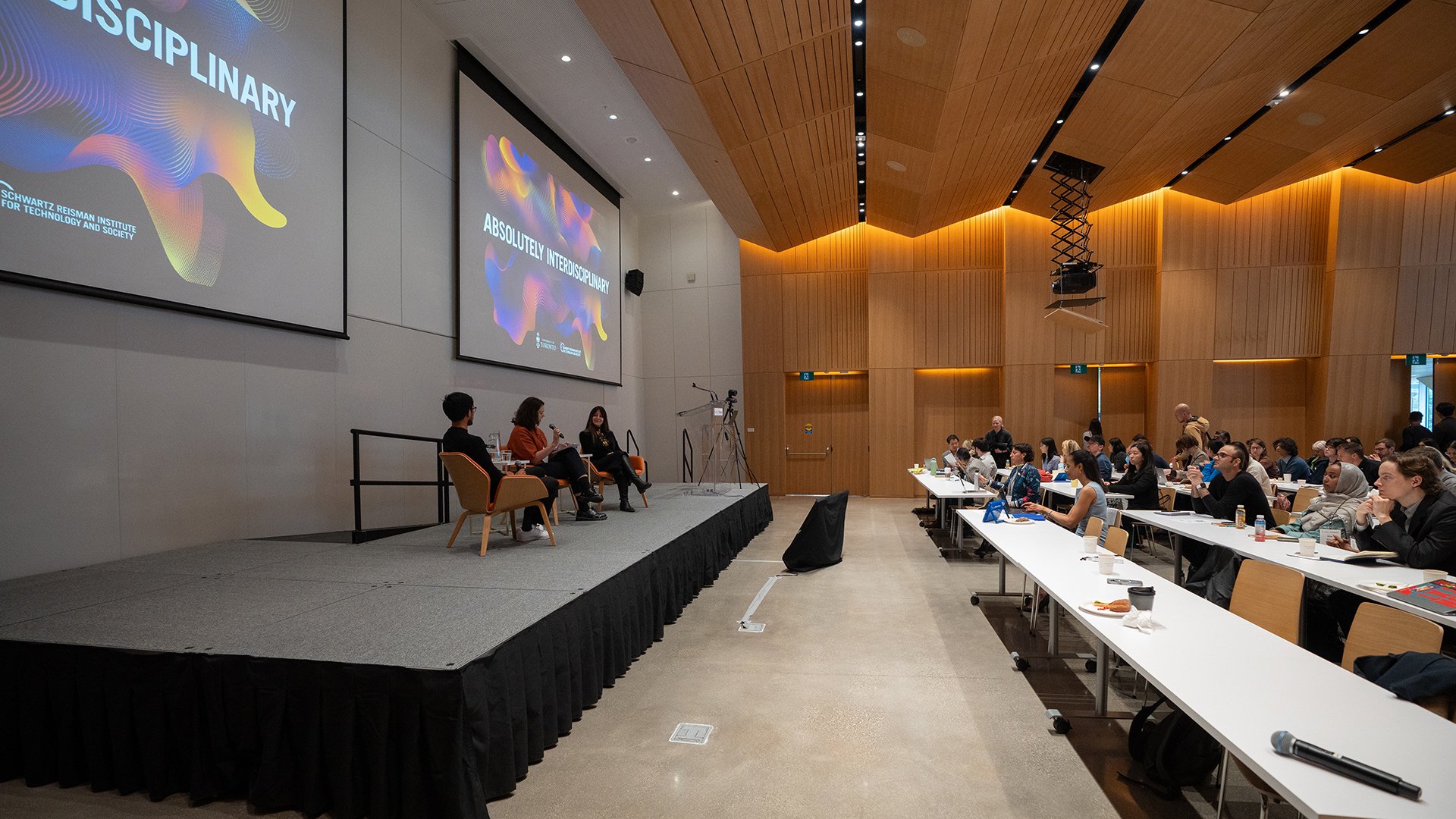New cohort of SRI faculty affiliates and postdocs announced for 2025
The Schwartz Reisman Institute welcomes eight new faculty affiliates and three postdoctoral fellows to its interdisciplinary research community, spanning technical, social sciences, and humanities fields. From top left to bottom right, SRI Faculty Affiliates Ebrahim Bagheri, Ali Bereyhi, Mamatha Bhat, Sharon Ferguson, Daniel Konikoff, Travis LaCroix, David B. Nieborg, and Atrisha Sarkar.
The Schwartz Reisman Institute for Technology and Society (SRI) is thrilled to welcome eight new faculty affiliates and three new postdoctoral fellows to its vibrant research community.
Spanning disciplines and departments across the University of Toronto and beyond, the new affiliates and postdoctoral fellows bring a wealth of expertise in areas such as machine learning, clinical medicine, human-computer interaction, and ethics. These distinguished researchers contribute to SRI’s mission of fostering interdisciplinary research and understanding the profound social implications of technology.
Meet our new cohort of 2025 faculty affiliates:
Ebrahim Bagheri, a professor in U of T’s Faculty of Information, is an interdisciplinary researcher whose work focuses on efficient and responsible information retrieval methods. Before joining the iSchool, Bagheri held a Canada Research Chair in Social Information Retrieval and an NSERC Industrial Research Chair at Toronto Metropolitan University. He founded and directed the NSERC CREATE Program on Responsible Development of Artificial Intelligence, which uniquely highlighted the need to balance economic development with social good. A recipient of the Government of Canada NSERC Synergy Award for Innovation in 2019 for his outstanding industry-academia collaborations, Bagheri serves as associate editor for IEEE Transactions on Network Science and Engineering and ACM Transactions on Intelligent Systems and Technology.
Ali Bereyhi is an assistant professor, teaching stream, in the Department of Electrical and Computer Engineering at the University of Toronto whose expertise lies at the intersection of machine learning, statistical signal processing, and information theory, including applications for non-linear models for information security. He received his PhD with distinction in 2020 from Friedrich-Alexander-Universität Erlangen-Nürnberg in Germany, where he continued as a postdoctoral research associate and lecturer from 2020 to 2023, focusing on statistical learning theory, information theory, and signal processing. From 2023 to 2024, Bereyhi conducted research at U of T’s Wireless Computing Lab, specializing in distributed machine learning.
Dr. Mamatha Bhat is a hepatologist and clinician-scientist at the University Health Network’s Ajmera Transplant Centre, a scientist at TGHRI, and an associate professor of medicine at the University of Toronto. Her research focuses on improving long-term outcomes of liver transplantation through a precision medicine approach that utilizes AI technologies. With over 165 publications in top journals and numerous accolades, including the 2022 CASL Research Excellence Award, Dr. Bhat’s work exemplifies the integration of AI into medicine for transformative healthcare solutions. Dr. Bhat is also director of the Clinician-Scientist Training Program in U of T’s Department of Medicine, and Partnership & Engagement Lead at the Temerty Centre for AI Research and Education in Medicine (T-CAIREM).
Sharon Ferguson is an incoming assistant professor in management science and engineering at the University of Waterloo. A recent PhD graduate from the University of Toronto and an alumnus of SRI’s graduate fellowship program, Ferguson's research looks at how we can use digital trace data created from modern communication platforms to better understand and improve teamwork. She has also led projects looking at human-AI collaboration for subjective decision-making and student persistence in machine learning and AI. Her work has been featured at premier conferences such as CSCW and CHI, and has contributed to the understanding of psychological safety, gendered communication patterns, and conflict resolution in engineering teams.
Daniel Konikoff is an assistant professor in the Department of Sociology at the University of Alberta. He completed his PhD at the University of Toronto’s Centre for Criminology & Sociolegal Studies in 2024, and is an alumnus of the SRI graduate fellowship program. Konikoff’s research focuses on the intersection of justice and technology, with recent work on the governance of police use of facial recognition technology in Canada. Konikoff was also the former director of the Privacy, Technology, and Surveillance program at the Canadian Civil Liberties Association, where he led advocacy efforts around Canada’s new legislation on AI and cybersecurity.
Travis LaCroix is an assistant professor in the Department of Philosophy at Durham University. His research centres on philosophical questions surrounding the dynamics of complex social systems, often using formal tools from evolutionary game theory. LaCroix previously held postdoctoral fellowships at Mila and SRI, where he studied the legal and social regulation of AI technologies, and before joining Durham he served as an assistant professor at Dalhousie University. His work bridges theoretical and applied concerns, addressing both the philosophical foundations and practical implications of AI technologies to better understand value alignment problems for AI systems. His recent projects includes interrelated studies in the areas of ethically-aligned AI, social dynamics, norms, and conventions, and, more recently, the philosophy of autism. LaCroix is the author of Artificial Intelligence and the Value Alignment Problem: A Philosophical Introduction, which will be published in March 2025 with Broadview Press.
David B. Nieborg is an associate professor of media studies at the University of Toronto, where he teaches at the Department of Arts, Culture and Media and is cross-appointed with the Faculty of Information. His research focuses on the platform economy, game industry, and digital culture. Nieborg holds a PhD from the University of Amsterdam, and has held fellowships with the Jackman Humanities Institute and the Institute for Advanced Study in Princeton. Nieborg has also had past careers as a consultant, journalist, and co-founder of an award-winning game company. His work has been supported by major funding agencies, including SSHRC and CIHR, and he is the co-author of Platforms and Cultural Production (Polity, 2021) and Mainstreaming and Game Journalism (MIT Press, 2023).
Atrisha Sarkar is an incoming assistant professor in the Department of Electrical and Computer Engineering at Western University. Her research focuses on human-centric multiagent systems, building computational tools to ensure the safety of autonomous AI-based systems interacting with humans and society at large. Sarkar’s work spans a broad spectrum of topics, including ensuring safety in autonomous vehicles, understanding polarization on online platforms, and developing cooperative agents in multiagent environments. Her research has been published in premier peer-reviewed journals, conferences, and workshops across diverse areas, including artificial intelligence, robotics, software engineering, and institutional and organizational economics. She holds a PhD in computer science from the University of Waterloo, and spent two years as a postdoctoral fellow at the Schwartz Reisman Institute working with inaugural SRI Chair and Director Gillian Hadfield. Sarkar also worked for eight years in industry, primarily at IBM Software Labs.
Meet our new cohort of postdoctoral fellows:
Ilya Grishchenko is a postdoctoral fellow at the Schwartz Reisman Institute under the supervision of SRI Director David Lie. Previously, he was a postdoc at the University of California Santa Barbara and the CISPA Helmholtz Center for Information Security, and received his PhD from TU Wien in 2021. Grishchenko’s research focuses on program analysis, specifically on automatic security vulnerability identification.
Jessica Hall is a postdoctoral fellow at the Institute for the History and Philosophy of Science and Technology at the University of Toronto and an alumnus of SRI’s graduate fellowship program. Her research is concentrated in the philosophy of computing, situated at the intersection of philosophy of mathematics, philosophy of language, and philosophy of science. Hall’s work focuses on what it means to call a system “computational”—tracing the influences of mathematical computability, functionalism, and various stripes of reductionism, on conceptions of physical computational systems, brains as computing systems, and “abstract” computing. As part of her postdoctoral research, Hall is working with SRI Research Lead Karina Vold’s Persicope Research Lab on projects that investigate the future of human and artificial cognition.
Sriram Ganapathi Subramanian is a postdoctoral fellow at the Vector Institute supervised by Pascal Poupart and SRI Associate Director Sheila McIlraith. His primary research interest is in the area of multi-agent systems, with a focus on issues of scale, non-stationarity, effective communication, and sample inefficiency in multi-agent learning systems. Subramanian’s current research seeks to bridge the widening gap between theoretical understandings and empirical advances of multi-agent reinforcement learning, and to make multi-agent learning algorithms applicable to a variety of large-scale real-world problems. Subramanian completed his PhD at the University of Waterloo and received CAIAC’s 2023 Best Dissertation Award. He has also published in top conference venues for AI research, including AAAI and ICML.
Grishchenko, Hall, and Subramanian join SRI’s current postdoctoral fellows: Mitchell Bosley (cross-appointed at U of T’s Policy, Elections & Representation Lab), Hayane Dahmen, and Toryn Qwyllyn Klassen (cross-appointed at U of T’s Department of Computer Science and the Vector Institute).
For more information about SRI’s research community, visit the Who We Are section of our website.



















